#but like. what do these cultural norms do to a society and person
Explore tagged Tumblr posts
Text
some thoughts on spirits (DAV)
I feel like the game has done a good job making Rook feel like someone with natural leadership abilities. And while I do love the companions in the previous games, I feel like DAV's companions are my favorites (at least currently; entirely possible that a replay of the older games would make me feel different!).
I also really like the different dynamics between Rook and their companions. Just... idk good vibes.
Also, here is Rook being very relatable for me:
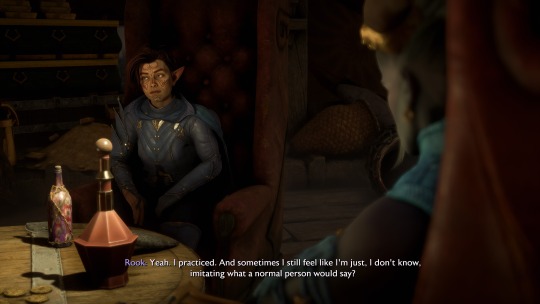
I am just really loving all the characters so much -- Lucanis stole my heart as my favorite (he's my 'personal demon' now in the character screen lol) but I'm very attached to all of my companions. I love how the game has made it easier to know when they have something new to say, and I like that they distinguish between 'conversations' and 'outings' in the companion quest section. I've really been enjoying getting to know them and I feel like this game has done a really good job appropriately gating dialogues and areas.
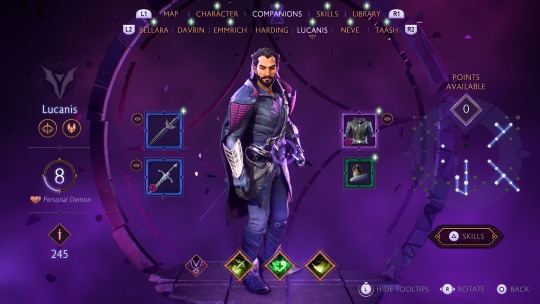
It feels like they found a good compromise between 'open world' and 'mission-based game'. Each of the areas feels really big but it's also gated in natural ways that get unlocked as the story goes on, so you can't bum-rush the Crossroads and do literally everything the first time you're there, for example. In DAI, I would sometimes have to impose my own pacing to make sure that things flowed well for me, and I haven't needed to do that with DAV.
One thing that leaving the Fereldan/Orlais area did is really let us get to know a lot of mages who don't have the same sense of shame and self-hate that mages are taught in the Chantry of southern Thedas (or the even more extreme way they are treated by the Qunari!). We got hints of this approach in earlier games, but getting to dive more in-depth into several cultures who do not have the same "let's toss all the mages into prison" approach to magic that southern Thedas has has been very illuminating! Obviously we've always had exceptions like the Dalish clans, but they were very much depicted as deliberately on the outskirts of society, and going against the Chantry-defined norm.
And to contrast, in DAV, I recently had a long conversation with Emmrich on the potential merits of lichdom! Basically an unthinkable conversation in either Ferelden or Orlais. Nevarra doesn't burn their dead and they don't have such a deep fear of the dead, demons, or magic itself. And it really just to illustrate how much the oppression of mages that was so much at display in the Circles is just... nonexistent in places like Nevarra. The oppression is cultural and it's religious -- it's not actually something that's necessary to 'keep magic in check'. (which, yeah, is obvious from the outside, but always nice to have reinforcement from the actual games!)
I'm also watching a let's play of DAI on the side and the person just got to Solas and Cole's personal quests and, yeah, they resonant so hard after the additional Solas revelations in DAV. And it really does feel so much like DAV is in a strong conversation with DAI (as makes sense). Solas and Varric are talking about Cole but Solas is also talking about himself.
Varric: "A spirit who is strangely like a person!"
Varric: "He came into this world to be a person. Let him be one."
Solas: "We cannot change our nature by wishing it." Varric: "You think?"
Solas: "You would alter the essence of what he is." Varric: "He did that to himself when he left the Fade."
[if Cole is made more spirit]
Varric: "...could have been a person." Solas: "Would that have made him happier?"
Is Solas's endgame becoming a spirit again? Or has he experienced and changed too much? (would it make him happier? is that a desirable goal?) Is it all a matter of perspective? Cole approves of the Inquisitor's choice whether they make him more of a spirit or more human. I feel like Solas would lose a lot of himself if he became a spirit again, but maybe that's a matter of perspective too.
And then Solas's DAI quest is all about dealing with the damage of a Wisdom Spirit being corrupted against its purpose -- the same kind of Spirit that Solas once was. Wisdom vs Pride (but once you're a person and not a spirit, you can be filled with both at the same time).
DAV is really making me want to do another run of DAI, and take Solas literally everywhere, lol. But the conversation about spirits in the 'real' world didn't start there either -- it started back in DAO, with Wynne. It continued in DA2, with Anders. Both DAO and DA2 are more 'standard' than what we get in DAI with Cole, in the sense that they were possessing a body (though with permission) but it's still part of the same conversation.
But the conversation really did explode into something bigger in DAI, with Cole as a spirit who was with us without possessing a body, and with learning that being briefly possessed can reverse Tranquility (via Cassandra's quest). And now, with what had been confirmed in DAV, we know that a spirit that takes mortal form can, over the generations, become mortal, as that's what the ancient elves did, so Cole could have kids who were fully mortal, maybe. And Cole did it without using lyrium (and thus taking something from the Titans to fuel himself) -- at least as far as I understand.
I am also finding myself very curious about where humans come from -- we know that the ancient elves were once spirits; we know that the dwarves are fragments of the Titans. Where did humans come from? Evolution? Or is there a magical answer for them too? Is the Maker a spirit and/or Titan who created humans specifically?
(I think it's implied that Qunari were genetically/magically engineered in some way, and possibly crossbred with dragons somehow?? iirc DAI correctly)
I'm really looking forward to removing my filters on DA-related stuff and reading other people's thoughts. I've covered my eyes and clicked on posts a couple of times so far and have been rewarded by mostly getting fanart and not spoilers, lol. Mostly.
I genuinely have zero critiques of the game so far, if anyone was wondering if I was just holding some back or whatever. I like the quality of life changes they made to a lot of little things like companion banter; I never had an issue with the art style*; and I'm enjoying the story and characters as they unfold.
(*I know that was a big thing with a lot of people but, confession time: I genuinely can barely tell a difference between DAI and DAV's 'art style'. You can change Qunari hairstyles separate from horns now in the character creator? People walk less awkwardly than in DAI? The menus are purple instead of green? idk, maybe my brain just doesn't register whatever it is that makes DAV so different, art-wise?)
I also love that I can literally just throw myself at boxes to break them open to get materials. It's so satisfying. I have a griffon that I can pet. idk, I guess I'm just a simple girl with simple desires. ¯\_(ツ)_/¯
Looking forward to playing more this weekend!
Current progress note: a Dalish clan (at least one) has been kidnapped for potential blood sacrifices, so trying to rescue them is my next main quest. I'm about eighty hours into the game.
#dragon age#dav#dai#dragon age spoilers#dav spoilers#dragon age the veilguard#dragon age inquisition#my meta
21 notes
·
View notes
Text
i love how cheery the music in ktisis hyperboreia is. its so unfitting yet fitting in the best way, like. we are dealing with a potential crisis and chasing this guy through a facility. the music is cheerful and bubbly. this whole problem started because this guy is depressed and feels isolated and alone in a his society, which literally requires masking around other people. the beginning of his meltdown being narrated periodically over the music is actually a pretty good metaphor for the situation as a whole. i am guiltily bopping along
#ffxiv#endwalker spoilers#kind of. i tried to avoid actually explaining anything#i could probably write an essay on [redacted] culture given they not only wear masks and robes with minimal individualization#(the only exception being presumably to sleep and for safety reasons)#but ALSO all constantly are in assumed guises that make them look more similar to each other!#showing your ACTUAL appearance is considered deeply intimate and somewhat embarrassing to do in public!#theres been some iffy takes assuming [redacted] is relible when he says hes the only one depressed#but THIS i think is far more interesting to examine in this context#yeah hes not the only one and yeah he says that bc depression does that to you#but like. what do these cultural norms do to a society and person#'was [redacted] a utopia' is the wrong question#'are utopias all theyre cracked up to be?' is the REAL question of endwalker#and so of COURSE the answer is no for this one#but not for the reasons i kept seeing people argue about on release#yelling at the void
0 notes
Text
my healing arc will be the story of me mending my relationship with the colour pink
#i used to love pink as a kid#i dont remember the reasons#as to whether because it was society imposed#or just a personal preference#but then overtime when i realised how mainstream pink was#and how overly feminine and girly it was/is#it lost its appeal in my eyes#pink went from being just a colour to the flag bearer of feminity#and as a masc who is too fem passing it felt hurtful to my energy to associate myself with anything pink#i ended up hating pink to judging everyone for loving it and for it's extremely gender imposed overuse#but now when i realise that irrespective of its social or cultural background#pink as a colour has always made me look aliver and brighter and me-er#despite it being only so because of the colour chemistry it has with my physical figure and NOT because pink is my colour or vibe#I've learnt to grow on it and accept it#and that i don't have to conform to gender norms to like a colour for what it is#it provides a fresher perspective looking at things as an artist who understands colours and their significance#now i accept and love whatever pink that works for me as i do with my feminine energy and counterparts#in the end pink is just a colour#bisexual#masc lesbian#pink aesthetic#pinkcore#pink moodboard#pink#pink blog#coquette aesthetic#coquette angel#coquette
7 notes
·
View notes
Text
What you need to understand about me- and what most of you all do understand about me, is that I will be aggressively enabling of living your weirdest, fullest truth, and I think it's bullshit that people act like it's detrimental to you to do so
I don't give a shit if me being a weird furry online loses me any job prospects or if people talk or whatever- maybe it's fucked up that we hold something as minor and meaningless as that over someone's head, that we give it weight it doesn't deserve, you ever thought of that? Maybe I see the culture of belittling a person as "cringe" for having interests counter to the norms as a failure of society, and I'm gonna throw myself onto the damn pyre and fight to my last breath against it, ever considered that?
I'm not just being cute and funny when I say "live your truth no matter how weird it is," because you know what?
If you're not hurting anyone in a real and tangible way, if you're respecting the rights and comfort of others, nobody- NOBODY has the moral grounds to stand against you, and to hell with them if they try.
That's my spiel.
3K notes
·
View notes
Text
facts about The Fear, after 20 years of life with her
The Fear is NOT:
an intruder, invader, or some other entity from "outside" You
inappropriate, wrong, or incorrect
a responsibility
a punishment
"irrational" or otherwise able to be understood through a relationship to "rationality"
an "inaccurate" representation of reality
The Fear IS:
an innate part of you
extra-rational—she exists outside and completely independent from "rationality" and does not respond to being judged according to that lens
self-love—her purpose is to protect you and keep you safe
self-sufficient—fear is a 100% whole, complete entity that doesn't "represent" or "reflect" something else
earnest—fear is always a 100% real experience that is exactly as it is felt, and, needing no comparison or reference to any external reality, it is not "dishonest" or "inaccurate"— it asserts a claim about only itself
subversive [not quite the word I am looking for but it will have to do]— is not necessarily beholden to social and cultural norms of what should be feared, how much, and how you should respond. She does not stop existing in the absence or suppression of vocabulary to describe her.
a demand for care— she does not just communicate to you but to the community you are part of; she calls attention to an obligation that this community has toward you, to make sure that you are safe within it and that your experiences are heard and understood.
yeah, so, i've had severe anxiety for my whole life and the way it's been treated and dealt with, and the way I've been taught to understand it, has really fucked me up so I am trying to lay the groundwork for understanding it differently
I think it's pretty fucked up that we're taught to see anxiety as deceptive or inaccurate. Now, obviously the images or projections in my fearful thoughts do not usually "reflect reality," but I have come to see this as...not particularly important?
Teaching an anxiety sufferer to restructure their thoughts to dismiss and contradict "irrational" fear is, in my opinion, the same as teaching a chronic pain sufferer to restructure their thoughts to dismiss and contradict pain with no clear physical source. You might as well speak of "irrational" pain, and pain has the same relationship to rationality that fear has.
"Irrationality" is a quality assigned to fear that is judged by an outside observer, or by the collective cultural biases and hang-ups of a society, as not appropriate to a given situation. This is total fucking nonsense and we should be talking about that, because...well, the first reason is that it implies some kind of fixed standard for what fear ultimately is and isn't for. i like to tell people to watch one of those Coyote Peterson videos where he's going to get a tarantula hawk wasp to sting him, because he's obviously having a strong physical fear response, even though he knows it won't kill him. Is it "rational" to fear suffering and not just death? How much suffering? Sit with that one a little while.
The second reason, which is even more convincing, is that the "rational" brain is not consulted at any point, ever, when a person feels afraid. It's just a response. The fear response is not routed through the conscious, sapient, reasoning brain. And thank God, because if we needed to hear back from an upstairs executive before we could decide whether to run from a lion, our species would be extinct.
Techniques like Cognitive Behavioral Therapy were absolute fucking shit at making my life any better, but fantastic at wrecking my ability to identify my own emotions, because Cognitive Behavioral Therapy for anxiety basically amounts to trying to brainwash yourself into thinking you don't feel the emotions that you do. It's a really neat way to develop bizarre psychosomatic symptoms and start experiencing anxiety through constant body pain, swollen lymph nodes, and digestive issues.
For an institution that pathologizes having "alters," psychiatry sure loves to encourage a suffering person to view normal and ultimately good parts of themselves as distinct, intruding entities to be shoved in a closet somewhere.
And yes. Fear is ultimately a good part of you, a part of you that loves you.
What began to set me free was feeling that acid terror and sickness and rage course through my body and realizing—really realizing—that I was being illuminated with this ancient, powerful force driving me to LIVE.
I want us to make it. I want you to live.
And you know what, I want me to live too.
I abandoned the doctrine of calming down—Lord knows it had never worked anyway—and started really just exploring and existing in the Fear.
How did that feel? Bad. Very very very very very bad and really not productive or helpful at all initially. Which was unavoidable. Necessary. She had been frantically clawing to communicate with me for so long, and I had been shutting her away, silencing her, resenting her presence in my psyche. I started trying to show gratitude toward the signals my body gave me. I started trying to show gratitude toward her—and i guess the Fear was a Her now, this just seemed more respectful.
And it seemed like nothing happened, but several things happened.
I stopped searching for validation. That was a big one. At some point I just...stopped needing a "reason" or justification for the fear I felt (trauma???? neurodivergence???? neurodivergence trauma????) and the fact that I experienced it became completely sufficient and satisfying to me. So much guilt and confusion disappeared.
I also became steadily more confident about my own boundaries, particularly in regards to recovery.
It's awful now that I think about it, but I think I felt this sense of almost moral obligation towards "recovery," as if I needed to "overcome fear" to be Courageous and Virtuous. It made me feel crushing guilt to feel any hesitation about this.
But then this started to change. It became more real to me that was the only person affected by the steps I did or didn't take toward recovery, and there was no moral dimension to it. A therapist couldn't put me in a box I wouldn't willingly go into.
Freedom from these judgmental frameworks is really important to me. I think that I always hated the idea of getting "better" because it seemed like "better" would mean just getting better at submitting to things I was afraid of while everything felt just as bad as it always did on the inside.
And on some level—even though I could never put it into words at the time—I violently hated the idea of "recovery" from some of my fears because it seemed like the ultimate denial of agency. I didn't want to "become okay with it"—the possibility felt dehumanizing. It felt awful.
And I realize now that this is because The Fear represented something I needed to have a right to. Many of my most life-destroying fears centered around things being done to my body, and if I could have pressed a button and been no longer afraid, I wouldn't have, even though it would have spared me so much suffering, because...I needed it to be okay to want agency over my body. I needed it to be right. The Fear, in this case, was a demand that my body be treated as sacred.
I realized that there were many cases where The Fear was a territorial claim of sorts, a demand that certain needs be honored and met—She needs this. This is FUCKING non-negotiable.
And it really...prompted me to look backward on my life and see The Fear differently: not as a responsibility I had failed to shoulder (me?? a little child??? responsible?? Responsible for being brave, when every day felt like facing a firing squad?????) but as a collective responsibility
Because I was not alone in those memories—I was surrounded by adults that saw me suffering, and often dismissed, ignored or ridiculed it. The Fear grew larger and larger; why?—to protect me. Because teachers, nurses, doctors, and camp counselors did not do any of the thousand thousand things they could have done to make that little girl feel safe. Because my well-meaning parents praised me when I was "brave" but I, a little kid, literally couldn't communicate how awful it always felt.
The Fear was not there to torture me. The Fear was and is doing her best to keep me safe. It's not wrong, there's no need for guilt. It just is.
It doesn't feel good. But maybe one day it will feel better.
3K notes
·
View notes
Text
One Piece means a lot to me as a disabled person, which I think would be pretty surprising to anyone who only has a surface understanding of it. The supposed central theme of "follow your dreams" would be pretty alienating to someone like me, right? It really, really would be, if that's what it was actually about.
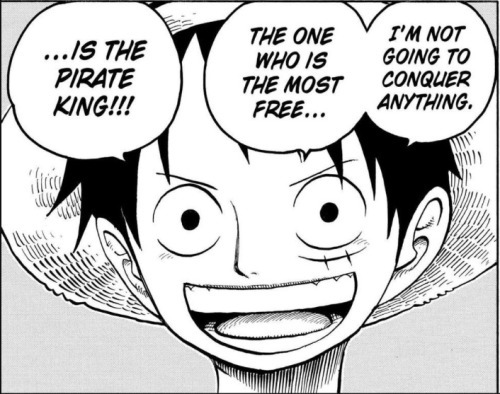
However, that ignores that Luffy's dream is to be the most free person in the world. And to attain that goal, the first thing he does is find friends to live life with. Over and over again, from the very beginning, he takes on their burdens, all in the name of being the most free.
Do you see what that would mean to me, as someone who needs more help to get by than is considered culturally normal, to the point that it puts me in a whole socially manufactured category of "other"? Not to mention, because of the infantilization of me due to that category, because of being forced so squarely into the "cared for" role, taking care of other people is deeply meaningful and empowering for me. However, the myths of independence and universal natural ability often make it emotionally difficult for my loved ones to accept that care.
The fear of asking for help, the guilt of being cared for, the weight of someone you loved who could not be as free as you, the insecurity of not contributing enough, the fear that you were born wrong, the self-hatred that says you are not worth the effort, Nami Sanji Zoro Usopp Robin Chopper Ace they all explore the painful obstacles to free connection. Through deeply impactful stories that weave beautifully into the larger one.
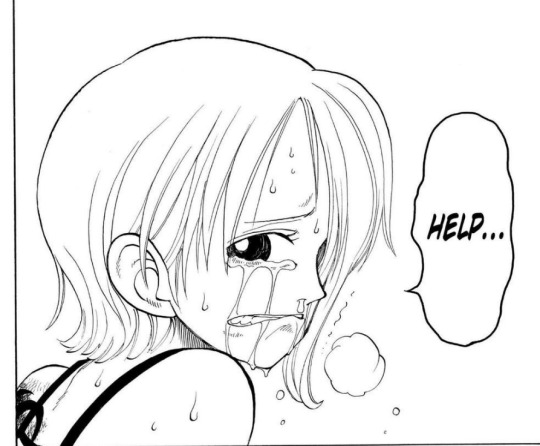
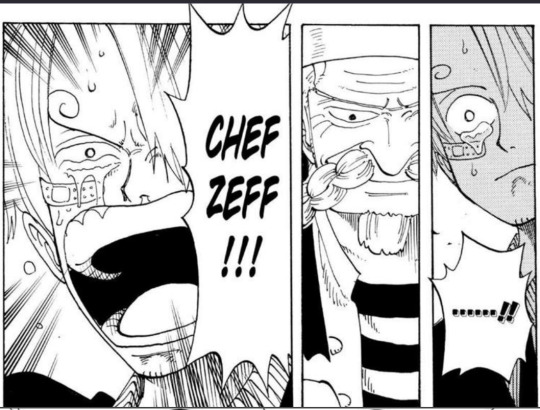
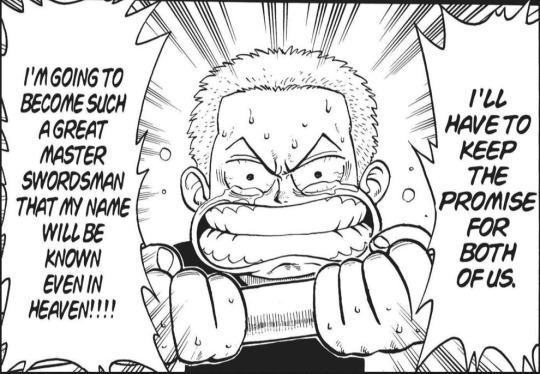
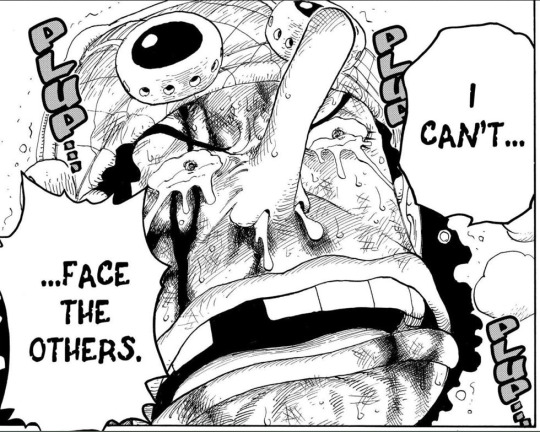
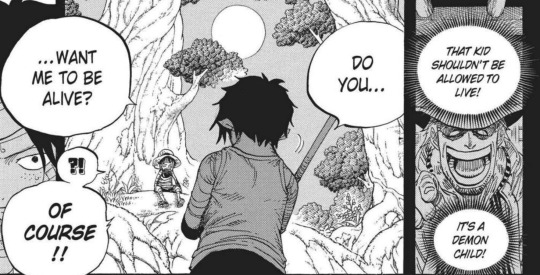
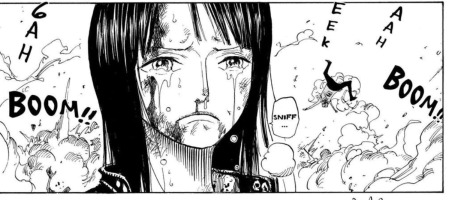
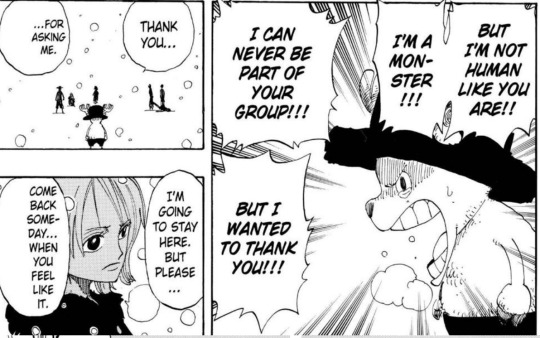
All centered around this one person who views loving them and living with them and carrying them as essential to his freedom. Who cannot, for countless reasons, live a normalized life of Structured Relations. Who views exploring and bickering and suffering and laughing with them as the ideal way to live. Who repeatedly puts his life and limbs on the line to do so.
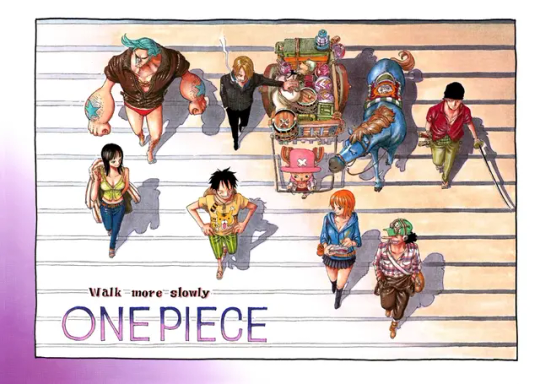
To me, it is an ultimate privilege and freedom to carry other people's burdens. To care for them and live with them. This is central to my whole perspective, and is completely informed by my life experience as a disabled person. I rarely see it reflected back to me. Let alone as powerfully and beautifully as Luffy does.
Nor the other half of it, of wanting to create this life with people in ways that aren't socially normal or approved. Of creating many varied lifelong intimate relations among equals, rather than conforming to the expectation of choosing One Person to live life with and then Creating More.
The utter lack of roles and norms is just as integral and powerful to the exploration of freedom and connection! It is meaningful to me as a queer person, yes, but even this is deeply influenced by my disability. I could never be that One Person, despite everything I have to offer, there is logistically far too much that I cannot do to be someone's equal partner in this society that demands so much from all of us. However, even if I could, I wouldn't want to! It doesn't make any sense to me to only have two people navigate life together on such intimate terms. Can't the demands of society be more comfortably met in a group? Isn't life more fun that way?
We are taught that we can and must do everything ourselves, I just happen to be one of the people that never had a chance to buy into that lie. To learn very early not just the necessity of interdependence, but the joy in it. To learn that it is most comfortably lived with more people involved. To me, close relationships are, love is, a natural extension of that understanding. One Piece celebrates interdependence constantly from the start, while never pretending that it is always easy.
The obstacles to free connection that I mentioned before, they are interspersed throughout the story, and they are always met with "I do the things you can't do, and you do the things I can't do." With, "Of course I can't use swords you dumbass! And I can't cook either! I don't know a damn thing about navigation! And I can't lie!"
These are intentionally impactful moments, and they define the series. I found it very fitting that the Fan Letter focused on a character who was empowered by Nami to feel free and live adventurously despite not being the most physically capable. The character is able by our definition, but the story is very affirming in a disability way, and it was extremely One Piece. I loved how it acknowledged this deep connection between One Piece and the lived reality of disability and celebrated it as integral as it is.
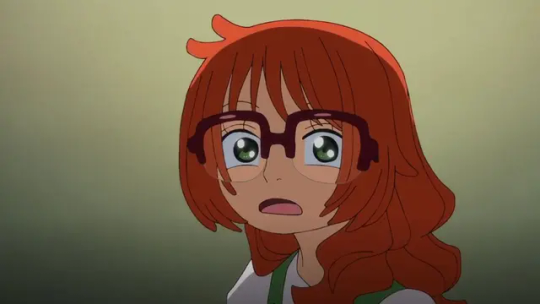
I also believe that absolutely none of this is intentional. It is simply an earnest exploration of human relationships, emotions, and behavior, and it naturally arrives at a radical and disability-affirming viewpoint. Because we are the monkey wrench in the deeply unhealthy (lol) and dominant line of thinking that independence is all. So naturally anything that also disputes that thinking has a disabled-perspective feel to it. The best part is how much it doesn't give a fuck! One Piece is aggressively against conformity in human relationships, in a way that is hard to find in our new world of self-conscious authors.
It's also, you know, the worst part, in terms of all the outrageous bigotry and offensive character design, but god damn it if it doesn't elevate the good parts to unbearable heights. Even the bad character designs can sometimes be more impactful for their intentional "ugliness", when those characters are inevitably taken seriously despite their appearance and the stereotypes they play on, it hits hard every time. I do have a simple hatred for many choices, there is no pay-off for much of the awful problems in numerous character designs and dialogue. But no matter how upset I can be by those things, in the end they can't succeed in pulling me away from One Piece. It's just so crazy and unique and great and terrible and beautiful and I LOVE IT.
#WOOF. FINALLY FINISHED THIS POST.#I am basically always trying to articulate this. I've written so many long posts.#but fan letter got me to give it my best effort once more. ITS SO GOOD!!! YES THAT'S WHAT IT'S ALL ABOUT!!!!#i love especially the meaning of it being USOPP who finds mimi (my headcanon name for nami's fangirl) and gives her directions.#he who most recently and directly struggled with his lack of ability. she doesn't even know about that.... ough....#YOU DON'T HAVE TO BE THE MOST CAPABLE TO GO ON ADVENTURES!!!!!!!!!!! GO MIMI!!!!!!!!!!!!!!!#my posts#one piece#op fan letter#opfl#one piece meta#op meta#one piece analysis#op analysis#i guess lol i hope this reaches some people despite you know. being. how i am.#(intense and clearly having gotten very deep into my particular perspective after endless verbalizing)
167 notes
·
View notes
Text
I don't want to sound like an apologist for anything but I feel like it should be acknowledged that the question of morality in different periods of history is complex and not easy to answer.
If you do say things like 'marrying an underaged person was totally okay back in the 1700s so what they did was totally fine actually' it definitely does ring alarm bells (as it should!)
That is not the exactly the same thing as saying 'considering the historical context of the era this person lived in, their behaviour would have likely not been considered too far out of the ordinary'. And I believe you can probably replace this with people's views of slavery or domestic violence and get to a pretty similar thing.
Is it dark and depressing? Sure. It's also, to the best of my knowledge, often fairly accurate.
I mean, I would have to do an actual research on this particular question to make any more definite statements. But just look at Ancient Greece's societal norms concerning relationships. That is definitely a challenge any historian needs to grapple with, but saying that every other man living at that time was a monster just isn't very useful, and doesn't feel like great academic work either.
Sometimes you would need to take a step back and try to look at these issues with more of a dispassionate curiosity to try and understand them. (As with Ancient Greece - what role did these relationships serve? How did they influence Greek culture? The structure of Greek society? etc.) That doesn't mean you renounce your own sense of right and wrong.
I feel like the best approach would be to acknowledge your modern perspective and clearly mark it in the text (something like 'by our modern standards, this would of course be seen as...' or even focus on writing articles from the perspective of the affected/opressed). But then also write about the way such behaviour would have been viewed in the time it took place. This does not, in my opinion, excuse the behaviour - it just helps to put it in the necessary context.
The bonus of this approach is that it allows the historian to highlight when someone's behaviour is genuinely considered morally reprehensible even by the standards of the time (something like 'even in a misogynistic society, his treatment of women was marked as particularly reprehensible' -> well better than that but it's also midnight, I'm tired and I'm sure you get my point).
There is also the possibility that some behaviour that is considered totally okay today will be seen as completely reprehensible by someone reporting on it hundreds of years from now. Something to keep in mind as a historian.
TL;DR definitely don't want to excuse any problematic behaviour but I think we should treat the question of moral norms in history as the complex and difficult issue it is, rather than jumping to conclusions
(also saying that someone's opinion is automatically unworthy because they haven't taken history classes at a university level just feels kind of elitist. Sure, an understanding of historiography and a critical approach are incredibly important, but it is not impossible to get at least the basic idea just from your own reading. And in any case, it is better to explain it rather than to dismiss the person's opinion altogether.)
#history#rant#historiography#frev#discourse#should lay off the coffee probably#might delete in the morning if I read it again and don't understand what I've been trying to say#ramblings
149 notes
·
View notes
Note
How do you write boys dialogue? it’s really hard when I write it it comes out like girls usually talk but when I write it to sound like a boy it comes out cringy and weird
Boy Dialogue vs Girl Dialogue
It's important to note that, generally-speaking, how a person speaks is not dictated by their sexual organs or gender identification.
There can be differences in when and how language develops, but these differences are general. Individuals vary.
Historically-speaking, and still today to a lesser degree, socialization into gender roles and cultural norms have also played a role in how people speak. But again, this is a general difference because individuals vary.
Can you tell whether the following sentences were said by boys, girls, or nonbinary people?
-- I'm in biology and recently we dissected a frog, which was really cool because everyone got to participate, and when my partner, Rachel, cut into it, it like splattered all over her, and I was just like whoa! -- Me and my brother collect corks, like, bottle cap corks, and um, we have a couple hundred in our rooms upstairs. -- My relationship with my parents I think, relatively, is pretty good. Obviously, being a teenager, there are moments when I don't really feel like talking to them. -- When something's on my mind, I usually go to my friends about it, I don't really talk to my brother. -- I don't know if they'd like to hear it, but [my friends] are definitely the burnout/stoner kids. But they're great people! -- I'm pretty nerdy. I do computer science.
Those are all real sentences spoken candidly by teens of different genders, but you can't really tell who said what, right?
So, when writing characters, it's infinitely more important that you make your character sound authentic to who they are. If you are writing about a 17-year-old girl in 1950, then of course there will probably be some differences in the way she speaks compared to her brother, because at that time gender roles were much stricter, and there was a lot of pressure on young women to be "prim and proper."
However, if you were writing a 17-year-old boy in 1950, he would speak quite differently from a 17-year-old boy in 2024. Not only because societal expectations and cultural norms were different then compared to now, but also because things like slang, pop culture, popular phrases and idioms, etc. are different now compared to then.
So, instead of worrying about your character's gender and how that influences how they speak, focus instead on who they are. What is their personality like? What is their education like? What types of people and things might influence how they speak? How does their society and family expect them to speak? What are their hobbies and skills? As long as what they say makes sense with what you've laid out for this character, you're writing authentic speech.
Here are some other posts that will help:
Writing Natural Dialogue Giving Your Characters a Unique Voice Recognizing a Flat Character
Also, I think it's very helpful to make sure you really know your character, so here's a post for that. Also, I find it helpful to cast my characters with real actors/models, because it helps me imagine them more clearly, which helps their dialogue come across more naturally in my head: 5 Tips for Getting Attached to Your Characters Guide: Casting Your Characters
Happy writing!
•••••••••••••••••••••••••••••••••
I’ve been writing seriously for over 30 years and love to share what I’ve learned. Have a writing question? My inbox is always open!
♦ Questions that violate my ask policies will be deleted! ♦ Please see my master list of top posts before asking ♦ Learn more about WQA here
204 notes
·
View notes
Text
I feel like a lot of times ppl talk about gaining their parents’ acceptance of their lgbt identities by being like “but I’ll still have a normal life! I’ll still fall in love and get married, and yes you can still have grandchildren!” at least I’ve seen that a lot in like. Media. But I feel like we need to normalize being queer in a way that is Not equivalent to a “normal life, just with genders switched”. I would argue that queerness as a way of life is an inherent rejection of the norm. Same goes with “love is love” and “it doesn’t matter who you love or fuck” kind of statements, like sure that’s Nice, but for me queerness is not about Who I love or fuck. It’s about who I am and my outlook on life. It’s a way of revolutionizing how I define my relationships and what “family” means. I am probably never going to “settle down” or get married, I may never even have a traditional committed romantic partner or anything like an “average” sex life, I sure as hell do not want to live in a single family home with a sole partner and kids and be isolated from all sense of friends and community, and even if I woke up straight tomorrow, I am never ever touching a razor or wearing makeup to work again. You don’t necessarily have to be “queer” to have this perspective, and I’m definitely not saying that all queer people do or should live this way, but I would argue that it is a perspective that emerges from queerness and is deeply intertwined with queer history and culture. If I wasn’t a lesbian I would be a completely different person, and that’s not just because I would be loving or fucking men. It’s because I wouldn’t have had to completely deconstruct my relationship to womanhood and femininity and romance and monogomy and all of these things that are deeply ingrained in the structure of society. and I Want straight and cis people to have access to the freedom that comes from that deconstructing, but I think we do ourselves and them a great disservice by trying to make queerness palatable or “the same as” straight/cis-normative life
#idk if this makes sense its just been something I’m pondering lately#queerness#queer culture#lgbt#lgbtq#lgbtqia#relationship anarchy#heteronormativity#amatonormativity
493 notes
·
View notes
Text



This post translates directly to @musas-sideblog's about how Touchstarved ties with Victorian horror and implicit/metaphorical sex, and I couldn’t stop thinking about it, so here is a lengthy theory. Enjoy :)
Note 1: Victorian era authors used an unholy amount of ways to imply sexual feelings/acts etc, so I here I will include only the ones that are of interest. Note 2: I've highlighted the "most important" parts. Note 3: I'm not an expert at this, so please bear with me and feel free to correct me. Note 4: Do I need to add a TW? I think it's obvious-

Overview: What is Victorian Horror?
Victorian horror refers to the genre of horror literature, art, and culture that flourished during the Victorian era, roughly from the mid-19th century to the early 20th century, coinciding with Queen Victoria's reign from 1837 to 1901. This period was marked by a fascination with the macabre, the supernatural, and the dark aspects of human nature, reflecting the anxieties and societal changes of the time.
Key Themes and Characteristics
Supernatural Elements:
Ghosts and Spirits: Tales of haunted houses and spectral apparitions were central to Victorian horror. Charles Dickens's "A Christmas Carol" (1843) and Henry James's "The Turn of the Screw" (1898) are notable examples.
Monsters and the Gothic: The era's literature is filled with monstrous creations and gothic settings, such as in Mary Shelley's "Frankenstein" (1818), Bram Stoker's "Dracula" (1897), and Robert Louis Stevenson's "Strange Case of Dr Jekyll and Mr Hyde" (1886).
Science and the Unknown:
The Victorian period was a time of great scientific advancement, but also of fear about the implications of these discoveries. This is evident in works that explore the dangers of unchecked scientific experimentation, like "Frankenstein" and H.G. Wells's "The Island of Doctor Moreau" (1896).
Exploration of the Human Psyche:
Victorian horror often delved into the darker aspects of the human mind, including themes of duality, madness, and the hidden, sinister side of human nature. This is seen in "Dr Jekyll and Mr Hyde" and Edgar Allan Poe’s works, such as "The Tell-Tale Heart" (1843).
Social and Moral Anxieties:
The literature frequently reflected Victorian society's fears and anxieties, including issues related to sexuality, class, and the role of women. Gothic novels often contained subtexts about societal norms and the consequences of transgressing them.
Urban Fear and Isolation:
The rapid urbanisation of the Victorian era contributed to themes of isolation, alienation, and fear of the crowded yet lonely cityscape. This is evident in the settings of many horror stories, such as Arthur Machen's "The Great God Pan" (1894).
Sexual Content: Victorian literature is renowned for its strict moral codes and conservative views on sexuality. Explicit depictions of sexual activity were considered taboo and were subject to censorship. Consequently, authors developed subtle and nuanced methods to imply sexual scenes or themes.
Literary Techniques for Implying Sexual Scenes
✧ Symbolism and Imagery:
Sexuality was often conveyed through symbolic imagery. Objects, actions, or natural phenomena could serve as metaphors for sexual activity or desire. For example, in "Dracula" by Bram Stoker, blood and biting symbolise sexual penetration and the exchange of bodily fluids, infusing the act with a sense of forbidden desire and eroticism.
Clothing and Undress:
Gloves: In Victorian culture, gloves were highly symbolic. The act of a woman removing her gloves in the presence of a man, or a man assisting her in this act, could signify a moment of intimacy or vulnerability. Similarly, a man giving a woman his gloves could be a sign of affection or a deeper connection.
Hats and Bonnets:
Corsets
Objects and Personal Items:
Locks of Hair
Jewellery
Books and Letters
Touch and Physical Contact:
Kissing Hands
Hand-Holding
Food and Drink:
Wine: Sharing wine or a meal in an intimate setting often suggested a prelude to deeper connection. Descriptions of characters drinking wine together in private could imply a romantic or sexual undertone.
Fruit: Certain fruits, like apples, grapes, or peaches, were laden with sexual symbolism. Eating or sharing fruit could represent temptation or indulgence. For instance, in Christina Rossetti’s poem "Goblin Market", the act of eating the goblin fruit is rich with sexual symbolism.
Flora and Fauna
Flowers and Gardens:
Roses: Roses were often used to symbolise love and passion. A red rose might suggest romantic or sexual attraction, while a wilted rose could imply lost innocence or sexual ruin.
Lilies: Lilies, especially white ones, represented purity but could also suggest a contrasting theme when associated with a fallen or tarnished character.
Garden Settings: Scenes set in secluded gardens or amongst lush, overgrown vegetation often hinted at secret or forbidden encounters. Descriptions of characters wandering through or tending to gardens could imply sexual exploration or awakening.
Flowers Blooming or Opening: The blooming of flowers often represented sexual awakening or the act of losing one's virginity.
Nature Imagery:
Rivers and Water: Flowing water and rivers often symbolised sexual desire and the act of lovemaking. For instance, in "Tess of the d'Urbervilles" by Thomas Hardy, Tess's encounter with Alec d'Urberville is often described with metaphors of nature and fluidity.
Storms and Weather: Storms, with their intense energy and sudden outbursts, were frequently used to symbolise sexual passion or climactic moments.
Birds and Beasts:
Animals, especially those that are wild or predatory, often symbolised primal sexual instincts and desires. The taming or interaction with these animals could imply a character’s grappling with their own sexuality.
Fire and Heat
✧ Phrases and Sayings
Euphemistic Language
Descriptive Phrasing
Dialogue and Confessions
Private Spaces:
Secluded or Dimly Lit Rooms: Scenes set in private, darkened rooms often suggested clandestine sexual encounters. The privacy of the setting allows authors to imply what could not be explicitly stated. In Wilkie Collins’s "The Woman in White", many key interactions happen in secluded spaces, hinting at secrets and hidden desires.
Dreams and Fantasies:
Dream Sequences:
Dreams and fantasies were used to explore a character’s subconscious desires and fears, often revealing their suppressed sexual longings. These sequences provided a socially acceptable way to delve into erotic themes.
Hallucinations and Madness:
Moments of madness or hallucination could serve as a metaphor for overwhelming passion or uncontrollable sexual desire. These states allowed characters to express forbidden feelings in a way that was metaphorically safe.
Physical Interactions and Horror
Touch and Proximity as Menace:
Unwanted or Forced Touch: In horror, touch that is typically a sign of affection or intimacy becomes a source of fear.
Physical Closeness in Horror Settings: Close proximity in dark, secluded places amplifies the sense of claustrophobia and vulnerability, turning what could be an intimate setting into one fraught with terror.
Undress and Exposure in Horror:
Loosening Corsets and Vulnerability: The act of undressing or loosening clothing, which can be a prelude to intimacy, in horror often leaves characters vulnerable to attack or exposure of their deepest fears.
Food and Consumption in Horror
Cannibalism and Vampirism:
Blood as Sexual and Vital Fluid: The act of consuming blood, as in vampirism, blends the themes of sustenance and sexual exchange. The vampire's bite becomes a metaphor for both sexual penetration and the transfer of life force.
Example: "Dracula" is a prime example where blood consumption is deeply eroticized, with Dracula’s victims often portrayed in a state of ecstatic submission as he drains their blood.
Food as a Lure: Food and feasting, typically symbols of pleasure and indulgence, in horror contexts can be used to lure victims into dangerous situations.
Example: In "Goblin Market" by Christina Rossetti, the goblins’ fruit is both irresistibly tempting and dangerous, representing a forbidden and potentially fatal indulgence.
Plot and Character Dynamics in Horror
Power and Domination:
Common Dynamics with a Dark Twist
Predators and Victims: Characters who prey on others are often literal monsters in horror, representing the loss of control or innocence.
Secrecy and Concealment:
Hidden Desires and Monstrous Revelations: Characters who conceal their true identities or desires often find these hidden aspects manifesting as monstrous or terrifying in horror narratives, suggesting that repression can lead to dire consequences.
Clandestine Meetings and Forbidden Encounters: Secret meetings and forbidden relationships, often tinged with sexual implications, add an element of danger and fear, suggesting that transgressing social norms leads to horror.
Common Themes in Victorian Horror
Duality and the Doppelgänger:
Theme: The concept of duality, where a character has a hidden, darker side, or encounters a double (doppelgänger), often symbolises the internal conflict between good and evil within individuals.
Connection: This theme reflects Victorian anxieties about identity, morality, and the consequences of repressing one’s darker impulses.
Gothic and Supernatural Elements:
Theme: Victorian horror is rich with Gothic elements such as haunted houses, dark landscapes, and supernatural beings. These elements create a sense of dread and evoke the mysteries of the unknown.
Connection: The Gothic setting often serves as a backdrop for exploring human fears, isolation, and the impact of the supernatural on everyday life.
Decay and Degeneration:
Theme: The fear of decay and degeneration, both physical and moral, is a recurring motif. This theme often examines the decline of individuals, families, or societies and the consequences of corruption and vice.
Connection: This theme mirrors Victorian concerns about the erosion of social and moral values amidst rapid industrial and social changes.
Madness and Psychological Horror:
Theme: The exploration of madness and psychological horror delves into the fragility of the human mind and the terror of losing one's sanity. This often includes hallucinations, obsessions, and the thin line between reality and delusion.
Connection: This theme resonates with Victorian fears of mental illness, the limitations of medical knowledge, and the impact of societal pressures on mental health.
Forbidden Knowledge and the Faustian Bargain:
Theme: The pursuit of forbidden knowledge and the resulting consequences is a central theme. Characters who seek power, immortality, or forbidden truths often pay a heavy price, reminiscent of the Faustian bargain.
Connection: This theme highlights Victorian anxieties about scientific progress, moral boundaries, and the potential hubris of human ambition.
The Uncanny and the Unknown:
Theme: The uncanny involves the strange and unfamiliar becoming eerily familiar, often unsettling the reader and characters. It blurs the lines between reality and the supernatural, invoking fear and discomfort.
Connection: This theme taps into Victorian fears of the unknown, the foreign, and the otherworldly, reflecting broader anxieties about social and cultural boundaries.
Death and the Afterlife:
Theme: Victorian horror frequently grapples with themes of death and the afterlife, exploring the fear of mortality, the possibility of an afterlife, and encounters with the dead or undead.
Connection: These themes reflect Victorian preoccupations with death, the spiritual realm, and the possibility of life beyond death, often intensified by the era's high mortality rates and interest in spiritualism.
Isolation and Alienation:
Theme: Isolation and alienation are prevalent themes, often highlighting characters who are physically or emotionally detached from society, leading to their vulnerability and descent into despair or madness.
Connection: This theme resonates with the Victorian experience of industrialization and urbanization, which often led to feelings of disconnection and loneliness.
Class and Social Anxiety:
Theme: Victorian horror often explores themes of class and social anxiety, including the fear of losing social status, the consequences of poverty, and the tension between different social classes.
Connection: This theme reflects the rigid class structures of Victorian society and the fears and tensions that arose from social mobility and economic disparity.
Moral Corruption and Hypocrisy:
Theme: Victorian horror frequently critiques the era’s moral standards and exposes the hypocrisy of societal norms. Characters who appear virtuous often harbor dark secrets or engage in morally dubious activities.
Connection: This theme mirrors the Victorian concern with appearances and the underlying tension between public propriety and private desires.
The Five Pillars of Victorian Horror & The Five Love Interests
The Supernatural and the Gothic (Ais)
Essence: Victorian horror often revolves around the supernatural, blending Gothic elements to evoke a sense of dread and otherworldly terror. This includes ghosts, vampires, haunted houses, and curses, which create an atmosphere where the boundaries between the natural and the supernatural blur.
Impact: The use of Gothic settings and supernatural phenomena provides a backdrop for exploring deeper themes of fear, mortality, and the unknown.
Psychological Depth and Madness (Vere)
Essence: Victorian horror delves into the complexities of the human mind, exploring themes of madness, obsession, and the psychological effects of fear and trauma. Characters often grapple with their sanity, facing inner demons as terrifying as any external threat.
Impact: This focus on psychological horror allows for a deeper exploration of character motivations and the impact of societal pressures.
Moral Corruption and the Double Life (Leander)
Essence: Themes of moral corruption and the duality of human nature are central to Victorian horror. Characters often lead double lives, presenting a veneer of respectability while concealing dark, sinful secrets. This tension between outward appearances and hidden truths reflects the era’s social hypocrisy and fear of scandal.
Impact: These themes critique Victorian society’s emphasis on propriety and the dangerous consequences of repressing one’s true nature. The idea of a double life or hidden self adds to the horror by suggesting that evil can reside within anyone, masked by a facade of normalcy.
Decay, Degeneration, and Disease (Kuras)
Essence: The themes of physical and moral decay, societal degeneration, and disease permeate Victorian horror. These motifs symbolise the fragility of human life and the inevitability of decline, reflecting the anxieties of a society grappling with rapid change and uncertain futures.
Impact: By focusing on decay and degeneration, Victorian horror underscores the transient nature of life and the ever-present threat of corruption and decline, whether through ageing, moral compromise, or societal breakdown.
Isolation and Alienation (Mhin)
Essence: Isolation and alienation are pervasive themes in Victorian horror, often depicted through characters who are physically or emotionally cut off from society. This separation heightens their vulnerability to external threats and internal fears.
Impact: Isolation serves to intensify the psychological tension and sense of dread, as characters confront their fears alone. It also reflects the era’s social and existential anxieties, including the fear of being disconnected or outcast from society.

Generally, I believe each LI connects with a pillair (as seen above). Perhaps by looking at the archetypes we could deduce propable endings and route elements.
Forgive me, for the following part is MESSY;
Ais
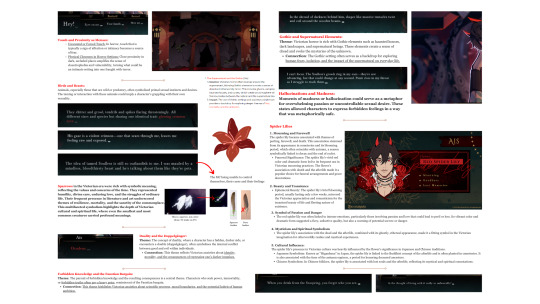
Vere
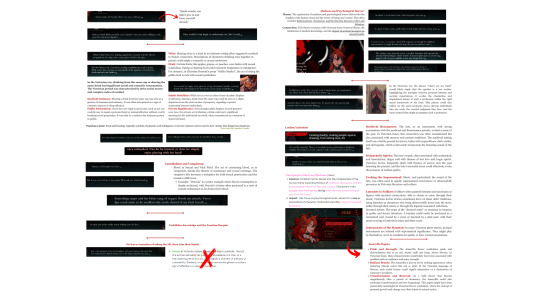
Leander
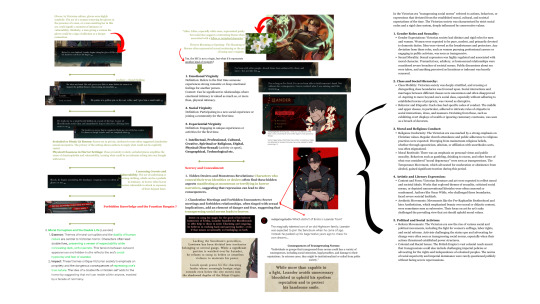
Kuras
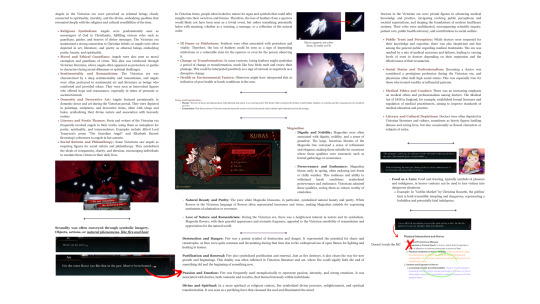
Mhin
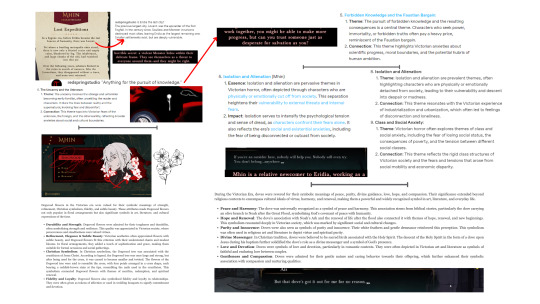

#THIS TOOK ME AGES#but it was worth it#vereletters#touchstarved theory#touchstarved theories#touchstarved ais theory#touchstarved vere theory#touchstarved kuras theory#touchstarved leander theory#touchstarved mhin theory#red spring studios#touchstarved#ts#touchstarved headcanons#touchstarved game#touchstarved oneshot#ais#ais headcanons#ais ts#ts ais#ais touchstarved#touchstarved ais#ais oneshot#vere#vere headcanons#vere ts#ts vere#vere touchstarved#touchstarved vere#vere oneshot
164 notes
·
View notes
Note
https://www.tumblr.com/wraithdance/765961917651140608/i-really-liked-your-explanation-of-the-whole?source=share
I am really bad at articulating my thoughts but I think about this a lot as someone who hopes to 1- major in neuroscience (i'm 18, going to uni next year) and 2- is trans. I know being trans is not the same thing at all as POC experiences with fic, very cognizant of that, but more to the point where I relate to the aspect of not being able to get over the like mental wall of seeing "neutral" readers as me? I don't know what my brain is doing when i read certain fics but sometimes i can't do it.
I feel like I should close read some of my favorite fic and least favorite fic to see if there are triggers I didn't notice on the first read. does that make sense or seem similar to what you experience? Again I know it's not the same thing, but like i am so curious as to what cis straight white people put in their fic that makes it so obvious that they're cis straight white.
I am sorry if this bothers you, really not my intentions, I am obviously a future brain nerd and i can't stop thinking about this
Congratulations fellow Nerd! You've activated my interest in Race theory and fandom writing from an academic perspective!
Writing reflects life and to answer this question properly, I have to talk about life shit to catch you up to speed, (this should help if you take a sociology or cultural anthropology class lmao) So, Welcome to:
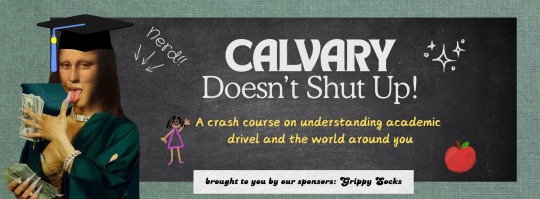
Calvary yaps: Sociology & Intersectionality in fandom writing 101!
Disclaimer: I'm just a random bitch on the internet who loves English and the ridiculousness of social hierarchies, this will be referencing American social constructs and in groups only, with a focus on my experience as a Black American woman who reads a shit ton of books. Don't fight me if you hate my explanation, I will simply not respond.
Read my house rules before sending me an ask, I'm just being a dumb ass rn and word vomiting my interests, so pls i beg no follow up questions unless I say I'm open to em later.
Definitions to know:
Socialization: the act of preparing individuals to participate in society by learned social norms taught in ones family or social settings like school/friend groups. (one can be socialized in gender, race, cultural practices, etc.)
Social Hierarchies: systems of social organization in which some individuals enjoy a higher social status than others (in my opinion this is a lingering safety measure from lizard brain cavemen hunter/gatherer days)
Intersectionality: A term coined by Kimberlé Crenshaw; The process of acknowledging the unique parallels a marginalized person experiences when they have more than one marginalization (ie: race, class, gender, sexuality, ability, size, etc.)
Matriarchal society: Social groups/family structures that center female figures as representatives of authority.
Implicit Bias: Unintentional bias a person may have towards a group or individual based on learned stereotypes, prejudices, perceptions based on another's background or state of being.

first, yes anon you are making sense! So the main question:
'What cis straight white people put in their fic that makes it so obvious that they're cis straight white?'
I've been mulling this question around in my head for a few days and tried to figure out how to articulate this without going into depth in Sociological theory, but I can't! So here we are lmao, this is long as fuck so TLDR here.
I've talked to a LOT of Black and PoC people over the last months because I thought I was the only one who felt strange or could tell immediately when a writer was white, despite doing the best job they could to be neutral.
Every person I spoke to agreed they could tell right away even if we don't share similar racial backgrounds.
The answer I've come up with to why that is, is because white people are socialized (taught by society/their parents how to behave) in a way many black and PoC people are not, so their reader characters will often act in a way PoC people have learned not to, so it flags for many of us.
I plan to answer another question about this at a later date so an example is with shit like:
An over deference to hyper masculine male characters (for PoC cultures like certain Black/Latine groups that are often matriarchal in nature and don’t ascribe to as many traditional gender roles, this is a flag), lack of interpersonal/familial connection, over meekness, no challenging of external factors so things just HAPPEN to the reader and lack of awareness of surroundings to name a few.
A lot of the language of the irl world places white cis people from Western countries as the default and everyone else as others. In which, PoC people have learned to navigate the world very carefully with a hyper-focus on what will potentially bring them harm/scrutiny/ostracism especially in white dominant spaces.
That extends to when we have down time while reading or partaking in media smfh.
I'm sure you've had to learn the same as a trans person navigating cis spaces and it's the same with any marginalization! If you are disabled you have an awareness of able bodied people and their expectations, same with being fat amongst skinny people, etc.
The more marginalizations you have, the louder the rules of social hierarchies become. Which is why many marginalized ppl stick close to those who 'get it' in their social groups as an act of safety in numbers. (Many of us attempt to have strong family connection/harmony because of this)
So referring to your comment about being trans is not the same thing at all as POC experiences with fic, it is when you are a Black or PoC trans person! My angel face @/buttdumplin has spoken a lot about that as a Mexican transman reading fics by cis people!
(Please for the love of God no one come to me explaining how marginalized they are so they shouldn't be lumped in with the white ppl PoC are cognizant of, I will check myself into a psych ward)
So what does that gotta do with reading fics?
No matter what anyone thinks, it is damn near impossible to not frame your writing from the perspective of your lived experiences. It's why even when I try my hardest to make my characters not sound Black, they will always read that way because I have been Black all of my life!
And it doesn't just happen with race, go on tiktok and search male authors writing women. (or here's another article lmao)
Also ask a Southerner how they know someone has never been to the South and don't know shit about our accents when they write Graves. There are linguistic tells that flag off and why we flame actors who pick up southern accents for their roles.
(They chew on that terrible goddamn Appalachian or Louisiana Accent not realizing Southern accents come in many fonts.)
So when I read a fic about Kyle Garrick from a non black person, I can tell the writer is non black by linguistic implications, the things they emphasize about him and what they don't. It doesn’t mean I don’t enjoy reading fics from non black people, I can just tell!
And sometimes that means I, and other PoC's associate the Reader as a white OC while reading fics.
For example, all black people are not monolithic because of our cultural and regional experiences, but many of us share common threads. That's usually family involvement, colloquialisms, that stupid fucking cookie tin our elders put sewing supplies in...
Other non Black PoC people might share similar cultural practices, so when I'm reading fics from say a latina, I will cock my head and go wait.... are you...? And surely enough, they are a person of color.
But even while reading from a non black PoC, I have to tread carefully because anti black sentiment exists in many cultures, which is why you'll hear me say Black and PoC/Non black people interchangeably.
It’s how the conversation of Implicit bias comes up, because unknowingly non white characters can sometimes be written with a hyper focus that makes them seem inhumanly one characteristic or with little to no background while the other characters are fully fleshed out.
like the character of color is just a stand in to move the plot around white characters forward.
So all that to say, without sometimes meaning to white writers will always sound off to me in a way that my brain can pick up on in the most minuscule ways because my awareness of my blackness/otherness has been drilled in from birth and reinforced by social norms.
I can even tell immediately if a white person has been around only white spaces their whole life with the jokes they tell lol.
In the grand scheme of things the race of the writer is most important to me when something jarring comes up that slaps me away from the experience, it explains so much of the disconnect.
Every marginalized person has a threshold for what they can ignore as a ‘trigger’ before they’re ejected from reader inserts, mine is usually the association with racial historical happenings, certain gender dynamics, etc.
It's why I mention crying like a little bitch when I read my friend Jess's (Kyletogaz) TF 141 Hair series, Dragon’s (Dragonnarative-writes) Transferrable Skills, and even Xavi's (Buttdumplin) Piercing fic.
Reading those fics felt like safety and familiarity. It was a moment where I realized I could drop the mental load I had no idea I was carrying, where I was trying to prepare myself for potential emotional damage and just READ.
It's also why as a Black person who fucks with kink and sex work it's been so touch and go when navigating dark fics/kink fics/fics about Sex workers.
Because there are different rules of engagement non white kinksters have to be aware of and that leads to a point on the collective vs. Individual experience as a PoC in kink, that I’ll eventually make a post about at some point or another. Maybe…
So yeah I’m tired of yapping. I hope this long shit was enough of an explanation!! Thanks to my friends Kiko, Jules, Xavi and Folded for yapping with me so I could articulate this better!!
#asks#calvary talks fandom shit#please I beg don't send me more asks on this#my poor brain needs to focus on some more school shit
84 notes
·
View notes
Text
ATSV Characters with a Goth S/o
heeeeeyyyyyy guys 😇 *slowly sliding the 100+ REQUESTS in my inbox to the side to make room for a new special interest*
🥀Cw: none, mostly fluff!!!
🥀Pairing(s): Hobie x reader, Miles x reader, Miguel x reader, Spot x reader

Hobie
he would LOVE any type of alternative partner tbh- he just LOOOVESSS that ur goth and will support you 100%
people who go against societies expectations/standards and don't fit in with the norm intrigue him, and your style is probably what piqued his interest in the first place
y'all definitely wear matching fits sorry i don't make the rules- hobie just can't pass up the opportunity to match w you!!! whenever you go to meetings within the spider society he always brings you along, regardless of whether or not you're a spiderperson and hobie loves showing off you and your style
MAJOR "THATS MY PARTNER‼️" VIBES
look me in the eyes and tell me hobia would not absolutely rock some funky eyeliner LIKEEEEE- he def lets you practice on him and will do your makeup for you too!!!
hobie loves thrifting with you, there is no way he isn't a major thrifter and you both definitely DIY a lot of your clothes
HE MAKES YOU GUYS MATCHING PUNK BATTLE VESTS FOR YOUR ANNIVERSARY, AND MAKES SURE THAT IT MATCHES UR AESTHETIC AS WELL!!
hobie absolutely has BLESSED music taste, but while he usually listens to rock, punk, dad rock, or post-punk type of music, i def see him enjoying more gothic/new wave music- especially if u introduce it to him!!!
i see him enjoying bauhaus, sisters or mercy, scary bitches, etc- he'll also give YOU a lot of music recommendations and help to expand ur taste!
hobie would also accompany you to any protests or conventions that you wanted to attend, and would act as your scary dog privileges
YOU TWO DEFINITELY GO TO CONCERTS TOGETHER OMG. I TOTALLY SEE THAT AS A SPONTANEOUS DATE THAT YOU TWO ENJOY A LOT
honestly hobie is a lovely partner to have if you are goth, and he's not only supportive but VERY enthusiastic about your fashion and lifestyle!
Miles
hes such a sweetheart!!! he definitely supports you if you're goth and asks a LOOOT of questions lmao
miles draws you and your fashion a lot, and will def design makeup or eyeliner ideas for you too!!! while ik this is more associated with punk, i also see miles drawing you a few custom patches and stuff like that
your kind of like his muse in a way, and miles just really enjoys sketching you, especially since you have such a unique aesthetic and such cool outfits
HE HAS DEFINITELY GRAFFITIED U SOMEWHERE‼️
he loves watching you get ready and do your makeup. seeing you do perfect eyeliner wings and heavy makeup in general lowkey relaxes him, and he just loves admiring you
im sorry but miles knows absolutely nothing about goth music or culture, ur gonna have to introduce him to a lot of the songs/bands!!!
while i don't think he's huge on the music at first, i think it would grow on him over time. its definitely the type of thing that he loves because YOU love it, and he sees how mu much you enjoy it so he starts listening to it as well so he can talk to you about it
i think his favorite band would be the cure, and his fav songs would either be boys dont cry or the walk (both by the cure- idk why thats so specific but they just kinda fit his vibe yk?)
miles likes holding hands a lot, and he loves when you wear rings or gloves or something along those lines because it just reminds him so much of you! your hands just feel different compared to other peoples and he just loves how unique you are
if you have a lot of piercings, miles would definitely ask about them or buy you specific jewelry for piercings!!!!
overall, very very cute and supportive about your style!!! (he lowkey gives bi wife energy, and iyk what in talking ab then ily mwah)
Miguel
he's pretty indifferent to your style at first, i don't see him as the type to judge much based on appearances. its your personality that really throws him for a loop, and a part of him admires your dedication to making yourself look how you want to look and truly living to be your best self, regardless of what others think
if you think miles knows nothing about being goth then be prepared for miguel bc he knows NOTHINGGGG- no music, no history, no political views, zero, zilch, nada, goose egg
if he cares about you i do see him being intrigued about your style, and once you two are officially dating is when he'll show more interest in your personal fashion sense
he strikes me as the type to like, NEVER listen to music, so he literally only listens to the music you like!!! he does find himself occasionally humming the tune of some strawberry switchblade song or casually listening to a siouxsie and the banshees song while he works, and over time you influence him a LOT with your music taste. he definitely associates any and all goth music with YOU, and that's probably why he starts enjoying it.
he's a "hand on you at all times" type of guy, and while he is rarely touchy with others, miguel is definitely keeping you close. your fashion makes that convenient for him, and he loves pulling you into a kiss by grabbing onto your belt loop or something of the sort
miguel loves how you look with and without makeup on and isn't afraid to tell you that, however, he really likes it if you incorporate his colors or color scheme into your makeup one day. he'll never admit it, but you keep catching him admiring you with the smallest smirk on his face every few seconds
if anyone ever gave u shit for what you wear and how you dress, especially someone in the spider society, you'd practically have to restrain miguel from drop kicking them across nueva york- he doesn't want anyone to be rude to you , and while he knows you can stand up for yourself, he just gets protective at times
Spot
goth? whats that???
he's lowkey such a nerd, and spends too much time being science-y and planning on how to beat spiderman to actually get caught up on fashion
spot doesn't know how he pulled you tbh, but he appreciates you nonetheless!!! he thinks you and your aesthetic are something to be admired, and will unabashedly tell EVERYONE he knows about you
he will shoplift any clothing or jewelry that you want, and he'll even take you to other dimensions where there are better alternative clothes as well
spot doesn't really have a face to do makeup on, but he'll offer to do yours for you! surprisingly enough he's pretty good at it, though he does work pretty slowly
spot loves fiddling with your accessories, whenever he's standing near you he's always reaching out to touch you in some way shape or form. he loves playing with any chains or necklaces you wear, and will help adjust them so that they lay correctly
he helps you get ready in the morning!!!!! if ur the type of goth to wear corsets, he makes lacing them up SO easy and will gladly do it for you
i personally hc that spot HATES seeing himself in mirrors/pictures, it reminds him sm of what he used to look like, but he LOVES taking photos of you and your style!! whenever you are wearing a cute outfit or have funky makeup on, spot adores just taking photos of you
if you ever did a makeup look inspired by him and his spots he would probably CRY :(
URGRHHRHHRRR I LOVE ATSV SMMMMMMM!!!! this post will DEFINITELY have a pt2 w more characters!!!!! i swear tho atsv literally pulled me out of the most horrendous burnout ever i FELT the artblock and writing block lift off of my body as i watched it. IM SO INVESTED I MADE A SPIDERSONA...
#atsv x reader#atsv x you#atsv x y/n#atsv x male reader#atsv x fem reader#atsv x oc#hobie spiderverse#hobie brown#hobie x reader#hobie x y/n#hobie x oc#hobie x you#atsv hobie x reader#atsv hobie#hobie headcanons#atsv miles#atsv miles x reader#miles morales#miles morales x reader#miles morales x you#miles morales x y/n#miles morales headcanons#miguel o'hara#atsv miguel#miguel spiderverse#miguel x reader#miguel spiderman#miguel o'hara x reader#miguel ohara#miguel ohara x reader
241 notes
·
View notes
Text
Friend Like Me: Murderbot's Relationships With Other AIs throughout The Murderbot Diaries
It’s important to me that the thematic core of The Murderbot Diaries is not only about determining what it means to be a robot person in a human world, but about showcasing so many ways to be a robot person in a human world. And about building relationships with other robot persons to support that self-actualization as both a robot and a person.
So often, in science fiction about robot personhood, the robot character is the only robot in the cast. Not only that, so often the robot character is the only robot they know.*
When media thinks about AI personhood, or Ais as characters in society, the AI character is often alone. Alone, and different. It’s a potent allegory for what it feels like to be an outsider, to be “other,” to feel “off” from the people around you. Whether a sympathetic friend or a scary unknowable villain, a lot of people can relate to feeling like that.
The Murderbot Diaries is doing something interesting, then, by showing us our protagonist Murderbot, the prototypical robot-among-humans, the robot as a parallel for queer and neurodivergent and outsider-cultural experiences in a world of expected norms, the robot with human friends, the one robot member of an otherwise all-human team… and it can’t live like that. So it leaves.
So far, the series feels split into two halves: the first four books, about Murderbot learning different ways to be a robot in relationships with humans, and the next three** about Murderbot learning different ways to be a robot in relationships with other robots, and a robot in a mixed society.
In All Systems Red, Murderbot starts off painfully alone. It repeatedly sees other SecUnits as enemies, and believes that SecUnits can't trust each other because they're all under control of humans. It has a very low opinion of SecUnits, including itself. Murderbot hates being used by humans for violence or for petty reasons, and admits that it wants to half-ass its job.
In Artificial Condition, Murderbot meets ART, a university research ship who loves its crew and loves its function. It is also free to be a snarky asshole, as Murderbot repeatedly notes (and assigns in its very name). This relationship to humans—genuinely caring for its crew, genuinely wanting to participate in its research and teaching function—is a very different relationship than Murderbot has had, though ART still needs to keep its intelligence and personality hidden from most humans for its own safety. Conversely, this is the book where Murderbot meets a ComfortUnit that is blatantly being abused and misused by its human owner, and it hates her. The contrast between ART and the ComfortUnit displays very different ways of Ais relating to their human “owners”—and what it means for them to get what they want out of life.
In Rogue Protocol, Murderbot confronts this theme most directly, with the bot Miki. Unlike the implications of secrecy we get from ART, Miki is not hidden from anybody; unlike with the ComfortUnit, Miki is a respected and equal member of its team. Murderbot has a very hard time believing that Miki is anything but a patronized “pet bot” to these humans, despite the evidence that the humans genuinely consider it a friend and teammate. Miki has never been abused, and never had to hide. Murderbot has a hard time accepting that this is a way bots and humans can relate to each other.
But Miki is still, in the classical sci-fi robot-on-a-human-team way, unique; it expresses to Murderbot, “I have human friends, but I never had a friend like me.”
This is a much better way of being a robot among humans than Murderbot has seen before, but it’s still not the ideal Murderbot wants, either.
Exit Strategy brings the theme full-circle and the quartet to a close. Murderbot faces off against a Combat SecUnit (or CombatUnit; Wells seems to change her mind about this). The Combat SecUnit represents everything Murderbot has rejected being, everything it has overcome on its journey of self-actualization. During their fight, the CSU rejects Murderbot’s offers of freedom, money, a fake ID, the opportunity to get out of its situation the way Murderbot has; it ignores the offer. Murderbot asks the CSU what it wants. The CSU replies, “I want to kill you.” The CSU represents the kind of SecUnit Murderbot does not want to be, the kind of robot it used to think it would inevitably be but has now seen so many other ways it can be. Murderbot says in the same scene, “I’m not sure it [the offer of freedom] would have worked on me, before my mass murder incident. I didn’t know what I wanted (I still didn’t know what I wanted)…” But at the same time, the confrontation makes it clear: Murderbot knows some things it doesn’t want, and the CSU is embracing everything Murderbot doesn’t want about being a SecUnit.
If this quartet is about what it means to be a robot, and to be a robot among humans, then the next set of books (Network Effect, Fugitive Telemetry, and System Collapse) is about being a robot among other robots, and a robot in a society that supports both humans and robots.
Fugitive Telemetry makes this most obvious, with its plotline about the free bot community on Preservation. Murderbot is uncomfortable around them in a similar way that it was uncomfortable around Miki. The Preservation bots are happy, fulfilled, responsible, mutually supportive, and have a meaningful community with both humans and each other that does not match Murderbot’s experiences of what being a bot, or being a bot among humans, means.
Network Effect brings Murderbot back into contact with ART, and introduces a new SecUnit, Three. Murderbot navigating its relationship with ART as a free agent and after a perceived betrayal is a huge part of the book. Murderbot’s disembodied-software-fork Murderbot 2.0, freed from much of Murderbot’s organic anxiety, shows itself much more willing to be social with other bots and constructs. System Collapse follows, bringing further depth and complexity to Murderbot’s relationship with ART and expanding its interactions with Three, and furthers Murderbot’s integration into the casual bot-human community that is ART’s crew. It also shows that Murderbot’s willingness to trust and even form tentative friendships with other AIs and systems, like AdaCol2, has expanded. The way it extends the governor module hack to the opposing SecUnits is informed a lot more strongly by Murderbot 2.0’s interactions with Three than its own previous clumsy attempts to reach out to the CSU in Exit Strategy, or abrupt dumping of the hack on the ComfortUnit in Artificial Condition. All of these plotlines emphasize Murderbot maturing into not just being a person among humans, but a person recognizing its place and obligations within society that includes both people like and unlike it.
The models of the many ways to be a robot person, and significant relationships and interactions with other robot persons, were and are crucial to Murderbot’s development, sense of self, articulation of its desires, and sense of belonging in the world. Murderbot isn’t alone, and it’s not the only person like itself that it knows. When offered a place in society, it is not the only person like itself in that society. Meeting other AIs, forming relationships with them, was crucial in helping it articulate what it wants in its life. Its human friends are incredibly important to it! That doesn’t stop being true. But so are its AI friends, and the other AIs it passed through the lives of.
This feels like one of the most honest and affirming depictions of what it’s like to feel “other”—that being around only majority people unlike-you, even the ones you like, even your friends, even the ones who mean the best for you and ask you what you need and do everything they can to provide it, can still be exhausting and alienating. Meeting other people like you—even if they’re like you in unlike ways, and have different ways of moving through the world—shows you the many ways to relate to the rest of the world, to be in the world. The many ways to relate to other people and to yourself. The Murderbot Diaries opens up a world where that can be true of bot/construct/AI characters, when so often in sci-fi, their loneliness and alienation is where the metaphor stops.
- - -
*Lt. Data from Star Trek: The Next Generation is probably the most famous example; the only positronic android like himself in existence, barring his evil twin who mostly just needs to be stopped. Others coming to mind include Becky Chambers's A Closed and Common Orbit, in which the AI character is trying to understand who she is in the context of being surrounded by humans; Alien, the secret android crewmate among humans is a threat, and in the sequel Aliens, the android crewmate is earnestly trying to prove he's not; Space Sweepers has a ragtag crew of several humans and a robot; most of the stories in Isaac Asimov's I, Robot are about a singular robot in a human facility. The setup "Human crew with their ship AI" is fairly common in sci-fi, from 2001: A Space Odyssey with its tragically antagonistic HAL9000 operating on a logic that would never occur to humans, to Wolf 359 and The Long Way to a Small Angry Planet where the ship AIs are struggling to determine and articulate how they want to relate to their human friends. Even in Ancillary Justice, Breq is alone and having to pass undercover as human cut adrift from her previous life as a ship's AI. (I know this changes later but I have not actually read the rest of the trilogy)
**as of System Collapse
209 notes
·
View notes
Text
alright can i just say something.

can I just voice my opinion can I be heard. this post Bovvers Me. now i know this is a joke post. but in reality, in practice, as it has been released into the world, its a half-joke-post. it gained so much traction because people really do think like this and not for entirely self-deprecating ways--though that would be bad too. listen, when it comes to LESBIAN GAY BISEXUAL TRANSGENDER sex, being submissive is more readily accepted in the culture that is afraid of sexuality, because to a certain degree it appears to remove involvement and intent (which of course in reality it really doesnt, and the idea that it does has been used by predators to obscure abusive dynamics, but i digress). being dominant, being horny without guilt, initiating and "leading" the scene, it involves a level of earnesty that many people are scared of. it is Cringe to them even tough they crave it, but what they want is an oscar worthy performance that hits all the unspoken levels of subtleties and post-post-irony, done by someone without feelings or boundaries or different levels of comfort, who is just here to act out someone elses fantasy and leave. it is a dreary picture of gaysexhavers SO afraid of being earnest, so intent on needlessly judging and policing others all because they do it to themselves first and foremost. a pursuit of joy and understanding gets trampled over by the need to appease The Shame and The Voyeur and The Peer Judgment and to conform to norms even in privacy. the notion that its shameful to be horny, that wanting things is predatory, that youre making a mistake and committing a sin to even be doing this in the first place. the need to have someone to project anxieties and shame onto, the need to look at someones "right" to have a sexuality, unspoken social currency, self-policing. moreover, when a person is designated inherently less deserving of normal things like safely expressing desire, kept perpetually afraid of unknowingly becoming a predator due to some intrinsic quality of theirs, their boundaries are more easily trampled over and their safety is not as readily taken into consideration. not to mention that such pathologizing of agency and expression mirrors the same old dehumanizing patterns found in wider society, as it ends up harming those most marginalized within lgbt spaces--POC, especially Black people, trans women, very gnc people, disabled people, and so on.
TL;DR - people will think and talk like this and then be like "where are all the doms..." this and "no one wants to top..." that
761 notes
·
View notes
Text
"why would you ship mizu and taigen together they're sooooo toxic ugh taigen is AWFUL and mizu should be with ME instead!!!"
of course they're toxic they're both deranged and terrible and that's why they're perfect for each other.
cuz like omg you think mizu would treat you well? mizu would abandon you. look at how she left ringo multiple times. ringo who treats her so well and is nothing but patient and caring and loyal. if you are insecure she will laugh at you because she has no social tact. look at how mikio said "it's a stupid dream" talking about his ambitions of regaining his honour and mizu straight up chuckles and tells him he's right because it IS a stupid dream. and at this point their relationship was cordial and she was even warming up to him!
like. arguably, taigen would be a better romantic partner (per the ideals of his time and culture of course), or at least he would be on paper. cuz i mean as a husband, as he is now, i think he'd be awful. but i'm talking about if you and him were dating or courting or just seeing each other romantically, he would be good to you. like we saw how he behaved with akemi and he was nothing but sweet and gentle. the very reason akemi wanted to marry him so bad was because she KNOWS without a doubt that he respects women and would treat her well. "oh but he cheated on her with the prostitutes while celebrating his engagement!" yeah but per the norms of the time and place, it was not considered cheating and akemi (as well as any wife or romantic partner of that period) would not have minded or even cared.
and yes taigen IS an asshole and he IS obnoxious but come on. so is mizu, if she is allowed to act like herself around you. mizu will tease you and mock you and challenge you and even poke at your insecurities (see:her goading mikio on even though he clearly did not view her teasing as light-hearted banter and took it all very personally). she would tell you to your face if she thinks you're being annoying (see:mizu rolling her eyes and telling akemi to straight up just "shut up" when she'd believed mizu had killed taigen).
mizu is not merely a hot and talented badass with a sword and the insane hyperfocus on her desire for revenge which literally drives her to withstand like, extreme amounts of damage and survive it. mizu is also flawed and the show does a good job at showcasing this, and showing us that she's not merely a victim but also a multilayered person. we see throughout that mizu is blunt and sarcastic and prideful.
oh what's that? oh right, very similar to taigen, who is also hot and talented with a sword and with insane hyperfocus on his desire to duel mizu and regain his honour. taigen who is also flawed (though, arguably, more so) as he is blunt and sarcastic and prideful.
the only thing that sets mizu and taigen apart is the fact that taigen is a man and is not mixed race, which thus affects their positions in society and how people perceive them. these are external factors. taigen being a boy who is not blue-eyed allowed him to easily mingle with the other kids in the village, all of whom were similarly fed the same prejudiced values which led them to gang up against mizu and bully her.
but take all that away. strip them down to the bare essentials. suddenly it's like they are the same person copy and pasted.
and that's what makes them even more interesting. yes absolutely they would be toxic. whatever souls are made of, mizu's and taigen's are the same (derogatory). and we literally see them fight all the time!!!! but the thing is they are both deranged when it comes to this.
do you get me. they both literally get turned on by sparring. mizu's whole spar with mikio was her way of flirting. just look at how she smirked at him and said "unsheathe it" like it's clear that this is an innuendo of not just unsheathing his weapon but also what's in his pants. then during the chopsticks fight with taigen in the snow, despite mizu literally being injured and taigen trying to attack her, mizu gets attracted to him. meanwhile taigen got a boner after wrestling with her in the forge.
taigen goes around saying he wants to kill mizu to regain his honour but he still literally risks life and limb for her constantly. mizu gives ringo stomach ulcers by going around flinging herself into near-death situations 24/7. she ups and leaves her beloved swordfather with barely a goodbye twice to pursue her batshit far-fetched quest for revenge (against people she doesn't even KNOW btw because she literally starts off with practically No Leads and not even knowing the NAMES of the white men who are her maybe-fathers).
these bitches are crazy and you know what good for them. that shit needs to be contained and quarantined though and that's why in that sense they would be good together.
i want to put them both in a jar and shake it very hard and see what happens. personally i think they will argue and insult each other while working perfectly in sync with each other to break out of the jar and then proceed to kill me and make out sloppy style over my dead body while they're both covered in blood.
like that's it that's the dynamic. send post.
#this is written half in jest btw dont take it too seriously. ppl can dislike what they want and ship x reader if they like#what annoys me is just when ppl are being rude about other ppl's ships like. unprovoked. like girl....#taimizu#taigen x mizu#mizu x taigen#blue eye samurai#im active on twitter again and the algorithm keeps putting bad takes on my tl against my will !!!#also yes i am aware im saying all this while writinf a tender yearning-filled slowburn fic of them#bcs i DO want them to be gentle. definitely i do. but that comes muuuuuuch later after they both wear each other's edges down ykwim#bcs if they get together any time soon they will literally be a flaming hot mess#sexy hot mess tho#but a mess nonetheless#they have the range! love them for that#fandom.rtf#shut up haydar#wank.mp3#kinda#might delete later
221 notes
·
View notes
Text
One time I asked my mom (in her 70s) whether she, personally, knew any people in so-called "traditional marriages." I defined a "traditional marriage" as follows:
A man and a woman, married to each other
They are both each other's first and only spouse, neither has been married before
Neither of them has any children with any other partner
Any children they have were born after the couple was married.
After thinking about it, my mom was able to come up with a few examples of such couples. But only a few. And she had to think about it.
Yet we still live in a society where this type of family is considered "the norm" and the much more common types (blended families, single parents, divorced people) are considered "exceptions."
And this is not the only thing like this! There are many experiences/lifestyles/family types that are treated as The Default or The Norm that, in fact, may not apply to a majority at all!
Even in discussions like "We should remember that not everyone has [normative experience]," it's still framed as though the normative experience is, of course, still the statistical norm. It might not be at all! Or maybe it is the statistical norm worldwide, or nationwide, but not in your particular community, or your social circle.
Sometimes it's necessary to look at global or national statistics to correct your bias of extrapolating from your social circle. Social bubbles are a real problem. But. But. Other times. It's useful to just look at your social circle and ask yourself "Do these population-wide statistics really apply here? Should I be looking at them to determine what's 'normal' instead of just looking around me?"
So here are some things that are culturally assumed in the U.S. to be "the norm", that you might want to ask yourself: How many people do I know personally that this is actually true of? (Other countries have their own maybe-not-that-normal norms that I'm not as familiar with, but feel free to weigh in on).
How many people do you know personally who:
Have a "traditional marriage" as described above?
Have a work schedule of Monday through Friday, ending at 5:00 p.m.? i.e. for whom Saturdays, Sundays, and evenings after 5:00 are "not at work" time?
Attended residential college from ages 18 to 22, and graduated with a bachelor's degree by age 23?
Had most or all of their college tuition and living expenses paid for by their parents?
Have, as an adult, the same surname as both of their parents, who were and still are, married to each other? Which was their father's surname which their mother took at marriage? i.e. whose parents could accurately be referred to as "Mr. and Mrs. [that persons' same surname]"?
Don't take any regular daily medicine?
Depending on your social circle, you might know very few people in these categories! But you probably still hear people say unquestioned, taken-for-granted things like "We should have the meeting at 6:00, so people can come after work," or "Of course parents of college students should have a say, since they're paying for it."
In many demographics, these things aren't just "not always true"; they're hardly if ever true. I wrote here about the false assumption that college students are uniformly single, childless young adults. Are you scheduling your events on the assumption that evenings and weekends are free time? For that matter, how many child care providers serve families during the hours that most parents actually work? Are we ready to admit that these things aren't the norm yet?
#normative social assumptions#family structure#family structure shaming#shift work#addressing parents as “mr. & mrs. [child's last name]” when you have no idea whether that's accurate
242 notes
·
View notes